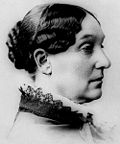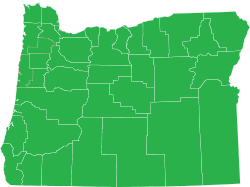- Oregon Ballot Measure 44 (2006)
-
Measure 44 Allows any Oregon resident without prescription drug coverage to participate in Oregon prescription drug program. Election results Yes or no Votes Percentage  Yes
Yes1,049,594 77.96% No 296,649 22.04% Invalid or blank votes 53,407 3.82% Total votes 1,346,243 100.00% Voter turnout 68.11% Election results by county YesNoSource: Oregon Secretary of State [1] Oregon ballot measure 44 was an initiated state statute ballot measure on the November 7, 2006 general election ballot. The Measure modified the eligibility requirements for Oregon residents to participate in the Oregon Prescription Drug Program. The program intends to make prescription drugs available to participants at the lowest possible cost through negotiated price discounts. It was passed overwhelmingly by voters, garnering 78% of the vote.
Contents
Background
Oregon law authorizes the Oregon Prescription Drug Program, which is intended to reduce prescription drug costs and to make prescription drugs available to participants at the lowest possible cost. At the time the measure was passed, existing law authorized the program's administrator to negotiate price discounts, to purchase prescription drugs on behalf of participants, and to reimburse pharmacies. At the time, only Oregon residents over age 54 whose gross annual income did not exceed 185% of federal poverty guidelines and who had not had private prescription drug benefit coverage for the past 6 months were eligible to participate in the Program. Measure 44 eliminated those restrictions and expands Program eligibility to all Oregon residents who have no prescription drug coverage except Medicare Part D.[2]
Description of the Measure
Ballot Measure 44 modified the eligibility requirements then in effect for Oregon residents to participate in the Oregon Prescription Drug Program. The program intends to make prescription drugs available to participants at the lowest possible cost through negotiated price discounts.[2]
The current program at the time limited to Oregon residents who were: a) at least 54 years old; b) earned less than 185% of the federal poverty level (then $18,130 per individual); and c) have not had private prescription drug coverage for the six months preceding application to the program.[2]
Ballot Measure 44 expanded the Oregon Prescription Drug Program by removing those eligibility requirements so that all Oregonians without prescription drug coverage regardless of age or income may participate. Participation in the Oregon Prescription Drug Program is voluntary. Medicare Part D prescription plan enrollees would be eligible to join.[2]
Participants receive a card to use at participating pharmacies to purchase prescription drugs at the discounted price. The measure did not call for any state funding for implementation of the measure.[2]
Election results
During the November 7, 2006 general election and Measure 48 was approved by a large margin, garnering 1,049,594 out 1,346,243 (78%) votes on this ballot line.[1] There was no organized opposition to the measure, and no arguments in opposition were filed for inclusion in the voters' pamphlet.
See also
Notes
- ^ a b Bradbury, Bill (7 November 2006). "Official Results – November 7, 2006 General Election" (Website). Elections Division. Oregon Secretary of State. http://www.sos.state.or.us/elections/nov72006/g06results.html. Retrieved January 4, 2009.
- ^ a b c d e Bradbury, Bill (7 November 2006). "Measure 44" (Website). Voters' Pamphlet. Oregon Secretary of State. http://www.sos.state.or.us/elections/nov72006/guide/meas/m44_bt.html. Retrieved January 4, 2009.
Topics in Oregon legislation Crime and sentencing Capital punishment · Measure 11 (1994) (mandatory minimum sentencing) · Measure 40 (1996) etc. (victims' rights) Abigail Scott Duniway was instrumental in establishing women's right to vote in Oregon.
Abigail Scott Duniway was instrumental in establishing women's right to vote in Oregon.
Elections and voting Gay rights Environment Land use Health care Minimum wage Taxation Tax revolt · Measure 5 (1990) (landmark tax law) · Measures 47 (1996) and 50 (1997) (adjusted Measure 5) · Kicker (tax rebate)Miscellaneous Influential people Background, further reading 2004 ← Oregon 2006 Elections → 2007 Categories:- Oregon 2006 ballot measures
- 2006 referendums
- Medicare and Medicaid (United States)
- Pharmaceuticals policy
Wikimedia Foundation. 2010.

